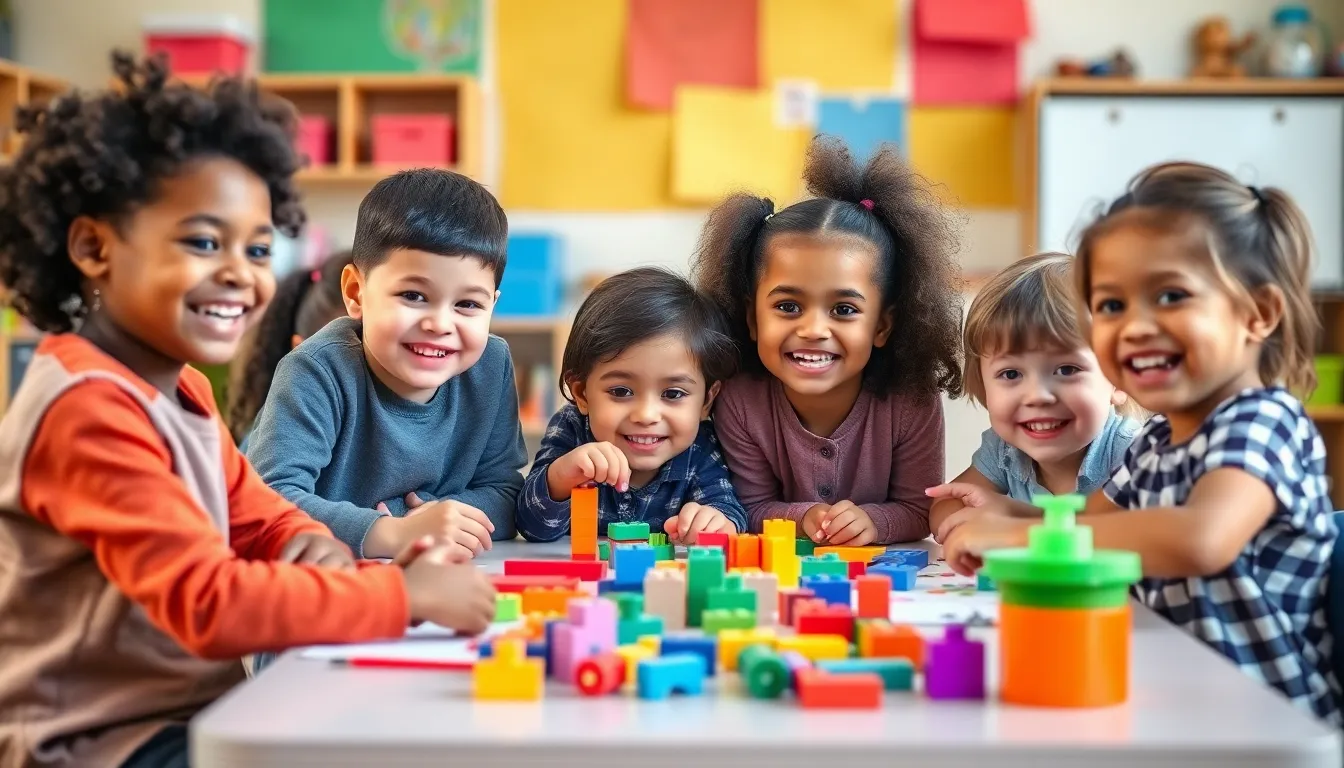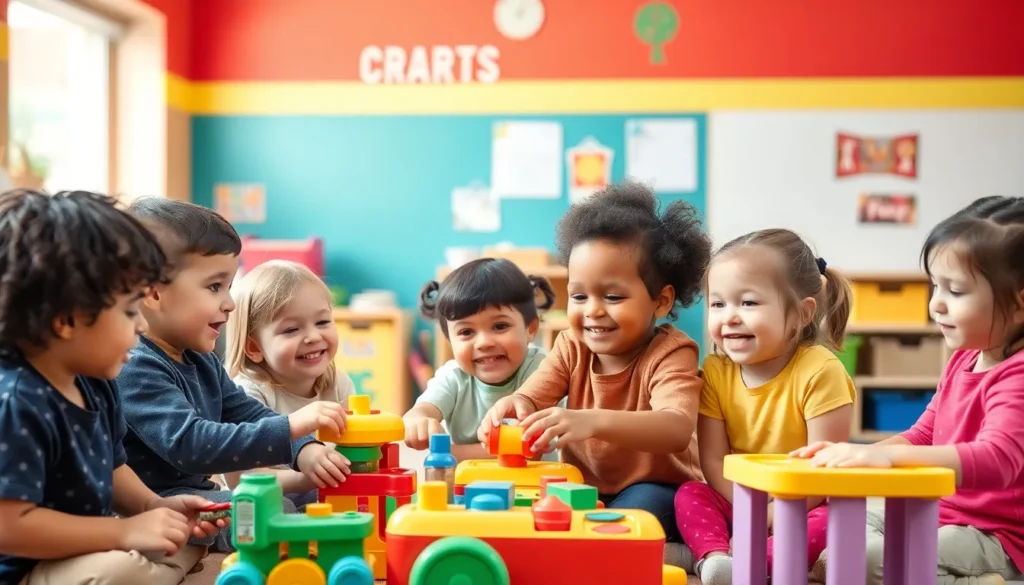Table of Contents
ToggleWhen it comes to preschool, parents often find themselves in a conundrum. Do kids really need to don their tiny backpacks and head off to school at such a young age? Or is it just a clever plot by coffee shops to keep parents fueled with caffeine while their little ones play with blocks? The debate rages on, and it’s more than just a matter of cute finger paintings and snack time.
Preschool isn’t just about learning the art of sharing or mastering the elusive nap time; it’s a crucial stepping stone in a child’s development. With a mix of social skills and early education, preschool can set the stage for future success. So, should kids go? Let’s dive into the delightful chaos of preschool and explore whether it’s a must-have or just a nice-to-have in today’s parenting playbook.
The Importance Of Early Childhood Education
Early childhood education, particularly preschool, offers crucial benefits for children’s development. Through structured activities, kids gain foundational knowledge and skills that serve them throughout their educational journey.
Benefits Of Preschool
Preschool promotes cognitive development in young children. Engaging in various learning activities enhances language skills and critical thinking abilities. Research indicates that children who attend preschool demonstrate higher academic achievement. Social-emotional skills also flourish during these early years. Preschoolers learn to express their feelings, develop empathy, and build relationships with peers. Programs tailored for preschool age cater to these needs effectively, providing a supportive environment for optimal growth.
Social Skills Development
Social skills development occurs significantly in preschool settings. Daily interactions with peers encourage sharing, cooperation, and conflict resolution. Such skills are vital for successful relationships as children grow. Kids learn how to communicate their needs and understand others’ perspectives. Participation in group activities fosters teamwork and collaboration. These essential social capabilities often lay the groundwork for future success in school and beyond. The structured environment of preschool helps reinforce these skills, ensuring children are well-prepared for the next stages of their education.
Factors Influencing Preschool Attendance

Several factors impact the decision for preschool attendance. Understanding these influences can help parents make informed choices about their children’s early education.
Family Dynamics
Family structures significantly influence preschool decisions. Families with multiple siblings may prioritize teaching older children responsibility, impacting the choice of enrolling younger siblings. Single-parent households might face challenges in balancing work and childcare, which can lead to earlier preschool attendance. Additionally, families valuing education often view preschool as essential for developmental success. Collaborative parenting, where both parents contribute to decisions, typically results in thoughtful consideration of preschool enrollment. A supportive family environment strengthens the likelihood of positive educational outcomes from preschool experiences.
Economic Considerations
Economic factors play a crucial role in preschool attendance. Affordability of preschool programs directly affects enrollment decisions. Families with higher incomes often have greater access to quality preschool options. Conversely, low-income families may struggle to afford tuition, limiting their children’s educational opportunities. Government assistance programs can alleviate some financial burdens, encouraging enrollment among economically disadvantaged families. Moreover, economic mobility is linked to early education, with studies showing that children from economically unstable backgrounds can benefit significantly from preschool experiences. Financial stability thus shapes preschool attendance patterns.
Alternatives To Preschool
Parents often seek alternatives to preschool that maintain educational value and social development for their children. Several viable options exist that cater to diverse needs and situations.
Home Schooling Approaches
Home schooling offers parents the flexibility to create a personalized educational experience. This method allows for tailoring curricula to suit specific interests and learning styles. Families can establish routines that include academic subjects along with life skills education. Engaging children in home activities fosters creativity and independence. Resources like online platforms or local co-ops support families pursuing this route. Community connections enhance socialization opportunities, crucial for child development.
Play-Based Learning Environments
Play-based learning environments provide children with hands-on experiences in informal settings. These nurturing spaces emphasize exploration and creativity over structured lessons. Activities often include art, music, and outdoor play, which stimulate cognitive growth. Children learn through interaction, making friends and developing essential social skills. Educators in these settings guide exploration, fostering curiosity and critical thinking. Many community centers or local programs offer access to play-based learning, enabling children to thrive outside traditional preschool settings.
Common Concerns About Preschool
Parents often wonder about the academic benefits of preschool. Academic rigor varies among programs, but many preschools emphasize foundational skills. These skills include language development, numeracy, and problem-solving. A study from the National Institute for Early Education Research highlights that children in quality preschool programs exhibit stronger early literacy and math skills. Structured activities promote learning through play, engaging children and making concepts easier to grasp. Investing in preschools that focus on educational outcomes sets a strong base for later academic success.
Transitioning to kindergarten causes anxiety for many families. Preschool helps ease this transition by introducing routines similar to those children encounter in kindergarten. Educators often emphasize social skills during preschool, nurturing cooperation and adaptability. Familiarity with the classroom environment boosts confidence among children. A smooth transition sets the stage for a positive educational experience, enhancing readiness for formal schooling. Parents who prioritize preschool attendance often find their children adjust more effectively to the demands of kindergarten.
Deciding whether to send kids to preschool involves weighing various factors. While preschool offers significant benefits in terms of social and cognitive development, each family’s situation is unique. Parents must consider their child’s needs alongside their own circumstances.
Alternatives to traditional preschool can also provide valuable learning experiences. Ultimately, the goal is to ensure children have a strong foundation for future success. Whether through preschool or other educational pathways, fostering a love for learning and social skills remains essential for young children’s growth.





